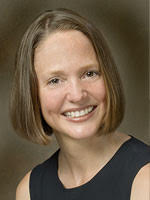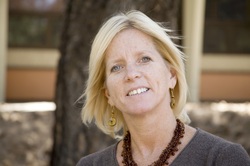
Sara A. Abercrombie, Ph.D., has extensive experience researching and teaching in the areas of learning, assessment, and motivation applied to diverse education settings for diverse learners. Her expertise lies in facilitating the development of context-specific educational environments and curriculum that optimize learning and motivation, and designing assessments and evaluations of complex and hard to measure learning outcomes. She also specializes in selecting, developing, and testing measurement tools to ensure that they are both functional and equitable. She has been the lead researcher, consultant, or evaluator on a wide range of projects focused on diversity and equity, and has experience working with a range of educational stakeholders, including school district personnel, teachers, parents, administrators, state education departments, community leaders, and medical professionals. Dr. Abercrombie has published her work in many top academic journals and regularly presents her work at national educational conferences. Dr. Abercrombie is an Assistant Professor of Educational Psychology at Northern Arizona University, and previously held a faculty appointment at Bowling Green State University. Her collaborators enjoy the theoretically grounded yet practical approach Dr. Abercrombie brings to every project.

Melvin Hall, Ph.D., has spent four decades providing program design and evaluation consultations with local, state, and nationally-focused entities. During a forty plus-year professional career in higher education, he has served in four successive appointments at Florida Atlantic University, University of California-Irvine, University of Maryland at College Park, and Northern Arizona University (NAU). He is currently a Professor in Educational Psychology at NAU, Senior Scholar at the American Association of Colleges and Universities, and an affiliate faculty member of the Center for Culturally Responsive Evaluation and Assessment at the University of Illinois, Urbana. At NAU, he was previously the Dean of the College of Education and the principal investigator on two five-year U.S. Office of Education GEAR UP grants, providing dropout prevention programs and services to thousands of middle and high school students throughout Arizona. Returning to full-time faculty life in 2002, he has melded teaching and scholarship in Educational Psychology with responsibilities as co-principal investigator on a National Science Foundation project for the Relevance of Culture in Evaluation Institute. Additional work at NSF included being part of an invited expert panel on the future of evaluation methodology in STEM programs and as a program officer for the ADVANCE and HBCU UP Programs. Dr. Hall has also served on the American Evaluation Association Board of Directors, as a member of the Inclusive Excellence Commission of the Association of American Colleges and Universities, and as the External Advisory Committee for the Collaborative for the Advancement of STEM Leadership.

Sarah A. Robert, Ph.D., is committed to cultivating inclusive local policy networks to tackle educational equity and diversity goals. She applies a variety of organizing techniques and qualitative research methods to projects. Her ultimate goal is to respectfully mediate the often-diverging interpretations of what "problems" a policy or program should address and forge a more inclusive policy making process and productive assessment tools. Her community engagement in Buffalo, NY, is where she has most applied these two approaches. She has focused on three areas: healthy school food systems, equal access within and across districts to experiential and place-based learning, and developing assessment tools for neighborhood-based youth enrichment programs that involve the broader community and local colleges. Over the last two decades she also has engaged in the development of future teachers as policy protagonists who understand policy making and learn how to advocate for their students and profession from seats at the policy making table whether in the United States (mostly in New York) or in Metropolitan Buenos Aires, Argentina. She has collaborated on the development of gender mainstreaming policies and the description of gender policy experts for the European Union to ensure gender and sexuality equity across public policy. She is an Associate Professor at the University at Buffalo’s Graduate School of Education. Her articles have been published in top tier journals across disciplines, reflecting her interdisciplinary training and perspective to education policy. Her books reflect her concern for crafting just policy from local perspectives.

Frances Julia Riemer, Ph.D., is an educational anthropologist who has conducted ethnographic research in the U.S., Africa, and Latin America. Her teaching and research focus on change and issues of equity and access, women in development and sustainable communities, and cultural difference and the social organization of community, school, and workplace. She has conducted needs assessments and evaluations on teachers’ professional development, innovative curricular design efforts, school-restructuring initiatives, and community-based natural-resource management and development projects. Dr. Riemer teaches undergraduate, graduate, and doctoral-level courses in the anthropology and sociology of education, research methodologies, international education, and feminist theories; she also facilitates trainings on culture and social organization, change initiatives, and research methodologies and methods for teachers, teacher trainers, and development workers. Dr. Riemer is a Professor in Educational Foundations and Associate Faculty in the Women’s and Gender Studies Program at Northern Arizona University. Her books include Working at the Margins: Moving off Welfare in America and Qualitative Research: An Introduction to Methods and Designs.

Jessica Solyom, Ph.D., has over a decade of experience working in college readiness and postsecondary education. Her specialties include working with first-generation students and/or students of color - particularly American Indian and Latino/a students. Dr. Solyom has worked with a number of federally funded programs, including Upward Bound and JumpStart, as well as specialty cohort programs that prepare American Indian teachers to teach in American Indian-serving schools. She has served as a program evaluator and provided 1:1 consulting for postsecondary institutions on increasing critical thinking with respect to diversity in curriculum, pedagogy, and classroom management. Her research and teaching focus on race and representation in education and the media, and she is currently an Assistant Research Professor at Arizona State University.

Michelle Téllez, Ph.D., is an interdisciplinary writer and scholar-activist trained in Community Studies, Sociology, Chicana/o Studies, and Education who specializes in ethnic and women’s studies. Her work focuses on identity, transnational community formation, cross-border labor organizing, gendered migration, autonomy, and resistance along the U.S./Mexico border. A former board member of the Phoenix based Arizona Workers Rights Center and the National Association of Chicana/o Studies, Dr. Téllez is a founding member of the Arizona Ethnic Studies Network, the Entre Nosotr@s Collective, and the Chicana M(other)work Collective. Dr. Tellez taught elementary school for several years before pursuing her advanced degrees. She has served on the faculty at Arizona State University and Northern Arizona University, and she is currently an Assistant Professor of Mexican American Studies at the University of Arizona. Given her areas of expertise, she is well positioned to provide trainings on immigration, border studies, and identity formation for teachers, students and community members across various school and community settings.